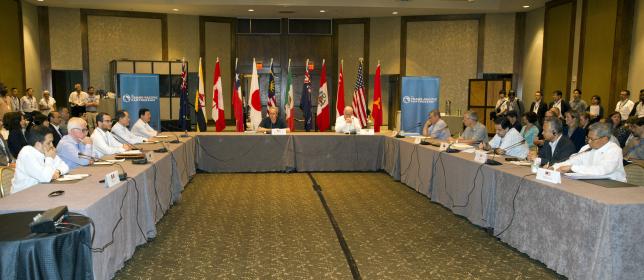Vietnam has finished bilateral negotiations with two top economies, the U.S. and Japan, on the Trans-Pacific Partnership (TPP) trade agreement, according to the Vietnamese Multilateral Trade Policy Department.
Minister of Industry and Trade Vu Huy Hoang joined his counterparts from eleven other countries in negotiating the TPP in a ministerial meeting from June 28 to July 31 in Hawaii, in order to address remaining issues before concluding the TPP talks, the department under the Ministry of Industry and Trade said on Monday.
The TPP is a proposed regional free trade agreement aimed at eliminating tariffs and lowering non-tariff barriers that is being negotiated by 12 countries throughout the Asia-Pacific region.
The countries include Australia, Brunei, Canada, Chile, Japan, Malaysia, Mexico, New Zealand, Peru, Singapore, the United States, and Vietnam, which collectively contribute almost half of global output and over 40 percent of world trade.
Minister Hoang was accompanied by a Vietnamese delegation of the leaders and representatives of some relevant ministries and state agencies, the department said.
After all the negotiations within the Hawaii meeting, Vietnam has completed all bilateral talks with all of the countries concerned.
The Vietnamese delegation involved in the negotiations worked with a positive attitude to protect the interests of Vietnam, while also willing to cooperate with the other TPP countries on the principle of mutual benefits in an effort to conclude their talks.
During the four-day meeting, Minister Hoang engaged in bilateral talks with U.S. Trade Representative Michael Froman and Japanese Economy Minister Akira Amari.
The Vietnamese minister also partook in meetings with Malaysian Minister for International Trade and Industry Dato' Sri Mustapa Mohamed and Mexican Secretary of Economy Ildefonso Guajardo Villarreal.
He also talked to Minister for Trade and Industry of Singapore Lim Hng Kiang and Minister for International Trade of Canada Ed Fast on the sidelines of the meeting, the department added.
Talking to the press recently, Minister-Chairman of the Government Office Nguyen Van Nen said that the central government focused on directing the Vietnamese delegation to join the TPP negotiations.
These efforts included lobbying the U.S. delegation so that the U.S. will recognize Vietnam as a market economy to reduce barriers to Vietnamese goods when they are shipped to other markets in the TPP area, Nen said.
The TPP countries have made significant progress, leaving only a handful of issues that need more time for consultation locally following the meeting in Hawaii, according to the Vietnamese department.
They have pledged to continue maintaining the momentum of negotiations to resolve the outstanding issues as soon as possible, the department said.
Pacific Rim trade ministers on July 31 failed to clinch a deal to free up trade between the participating nations after a dispute flared up over auto trade between Japan and North America, New Zealand dug in over dairy trade and no agreement was reached on monopoly periods for next-generation drugs, Reuters reported.
Trade ministers from the 12 nations negotiating the TPP pact fell just short of a deal at talks on the Hawaiian island of Maui but were confident an agreement was within reach, according to Reuters.
Speaking at a press meeting after the negotiations ended in Hawaii on July 31, Japanese Economy Minister Akira Amari said it is likely that the next round of TPP talks will take place late this month.
|
A local economist, Dr. Tran Vinh Du, told Tuoi Tre (Youth) newspaper that experts were a bit surprised by the results of the negotiations in Hawaii, which is expected to be the last round of talks for the TPP pact. According to Dr. Du, after the Obama administration obtained Trade Promotion Authority or Fast Track Authority from Congress, the countries participating in the negotiations were supposed to be able to seize that opportunity to conclude the pact. Vietnam is one of the nations which are quite flexible in negotiations so that the trade deal can be clinched soon, he said, adding that many people in the Southeast Asian country have felt disappointed at some countries continuing to maintain their hard-line stance. The causes of disagreement include the biggest and toughest issues which are not easy for a consensus to be reached overnight, he said. With this development, according to Dr. Du, it is very hard for the countries involved to conclude their negotiations this year as expected. |
Like us on Facebook or follow us on Twitter to get the latest news about Vietnam!


















































